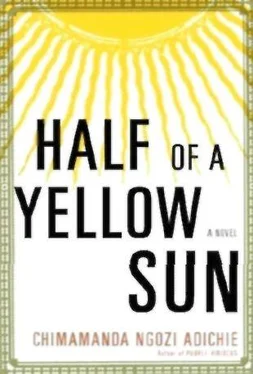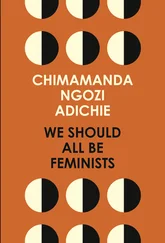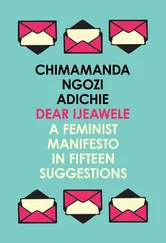A family of birds had nested on the roof of the classroom. In the mornings their chirping was interrupted by the sharp trill of the commander's whistle, a voice shouting "Fall in, fall in!" and the running and scrambling of men and boys. In the afternoons, the sun sapped energy and goodwill and the soldiers quarreled and played Biafran whot and spoke of the vandals they had blown up in past operations. When one of them said, "Our next operation will be very soon!" Ugwu's fear mixed with excitement at the thought that he was a soldier fighting for Biafra. If only he was with a real battalion, fighting with a gun. He remembered Professor Ekwenugo describing the ogbunigwe: "high-impact land mine." How glamorous it sounded, this Biafran-made mine, this Ojukwu Bucket, this wonder that was so perplexing to the vandals that they were said to send cattle herds ahead to understand just how the ogbunigwe killed so many. But when he went to the first training session, he stared at what was before him: a dull metal container full of scrap metal.
He wished he could tell Eberechi about his disappointment. He wanted to tell her, too, about the commander, the only one with a full uniform, sharply ironed and stiff, how he often barked into a two-way radio, and how, when the teenager tried to run away during a training session, he beat him with his bare hands until blood ran down the teenager's nose and then screamed, "Lock him in the guardroom!" Ugwu thought most about Eberechi when the village women came with wraps of garri, thin soup, and, once in a while, win-the-war rice cooked with some palm oil and little else. Sometimes younger women came and went in the commander's quarters and emerged with sheepish smiles. The sentries at the entrance always raised the barriers to let the women in, although they did not have to, since the women could easily walk in by the sides. Once Ugwu saw a figure with rounded rolling buttocks leaving the compound and he wanted to call out, Eberechi! although he knew it was not her. It was while looking for bits of paper on which he could write down what he did from day to day, for whenever he saw Eberechi again, that he found the book Narrative of the Life of Frederick Douglass, An American Slave: Written by Himself slipped into a tight corner beneath the blackboard. On the front page, property of government college was printed in dark blue. He sat on the floor and read. He finished it in two days and started again, rolling the words round his tongue, memorizing some sentences:
Even if it cost me my life, I was determined to read. Keep the black man away from the books, keep us ignorant, and we would always be his slaves.
High-Tech liked to sit next to him while he read. Sometimes he would hum Biafran songs in an annoying monotone, and other times he would chatter about this and that. Ugwu ignored him. But one afternoon the women did not bring any food, and a whole day went by with the grumbling of men. High-Tech nudged Ugwu at night and held out a tin of sardines. Ugwu grasped it. High-Tech laughed. "We have to share it," he said and Ugwu wondered how he managed to get it, how a child so young seemed so flexibly in control. They went to the back of the building and shared the oily fish.
"The vandals eat well, oh!" High-Tech said. "The last camp I infiltrated, when I was with the battalion at Nteje, their women were cooking soup with big-big pieces of meat. They even gave some to our men when they stopped fighting for one week to celebrate Easter."
"They stopped fighting to celebrate Easter?" Ugwu asked.
High-Tech looked pleased to have finally caught his attention. "Yes. They even played cards together and drank whisky Sometimes they agree not to fight so that everybody will rest." High-Tech glanced at Ugwu and laughed. "Your haircut is so ugly."
Ugwu touched his head, with the odd tufts of hair that the jagged glass had missed. "Yes."
"It is because they shaved it dry," High-Tech said. "I can do it better for you with a razor and soap."
High-Tech produced a bar of green soap and lathered Ugwu's head and shaved it with a razor blade until it was smooth and soft to the touch. Later, when High-Tech told him, "Operation in two days," in a whisper, Ugwu thought about the people who shaved their hair off as an act of mourning. Shaving as a memorial to death. He lay face up on his thin mattress and listened to the ugly sounds of snoring around him. He had proved himself to the other men by how well he did at training, how he scaled the obstacles and shimmied up the rough rope, but he had made no friend. He said very little. He did not want to know their stories. It was better to leave each man's load unopened, undisturbed, in his own mind. He thought about the upcoming operation, about blowing up vandals with his ogbunigwe, about Professor Ekwenugo's blown-up body. He imagined himself getting up in the moonlit quiet, leaping out, running until he got back to the yard in Umuahia and greeted Master and Olanna and hugged Baby But he would not even try, he knew, because a part of him wanted to be here.
In the trench, the earth felt like soaked bread. Ugwu lay still. A spider clambered up his arm but he did not slap it away. The darkness was black, complete, and Ugwu imagined the spider's hairy legs, its surprise to find not cold underground soil but warm human flesh. The moon floated out once in a while, and the thick trees ahead became dimly outlined. The vandals were somewhere there. Ugwu hoped for a little more light; the moon had been more generous earlier when he buried his ogbunigwe about thirty yards ahead. Now the darkness brooded. The cable felt cold in his hand. Next to him, a soldier was mumbling prayers in the softest voice, so soft that Ugwu felt he was whispering in his ear. "Mother of God pray for us sinners now and at the hour of our death." He shook the spider off and stood up when the vandals started shooting. The rattle of gunfire was scattered, loud then faint; the infantry was returning the vandals' fire from different directions and those vandals, those dirty cattle rearers, would be confused and would have no idea that the ogbunigwe mines were waiting for them.
Ugwu thought of Eberechi's fingers pulling the skin of his neck, the wetness of her tongue in his mouth. The vandals began to shell. There was first the whistle of a mortar in the air and then the boom as the mortar fell and hot shrapnel flew around. A patch of grass caught fire, lit up, and Ugwu saw a ferret by the cluster of trees ahead, hunched like a giant tortoise. Then he saw them: crouched silhouettes moving forward, a herd of men. They were in his killing range and it felt too soon, he had expected more to happen before they delivered themselves to him, before he detonated his ogbunigwe and it pushed outward in a spray of violent metal. He took a deep breath. Carefully, firmly, he connected the cable and the plug in his hands and the immediate forceful blow-up startled him, although he had expected it. For the briefest moment, fear clenched his bowels. Perhaps he had not calculated well enough. Perhaps he had missed them. But he heard somebody close to him shout, "Target!" The word reverberated in his head as they waited for long minutes before hauling themselves out of the trench and going over to the scattered corpses of the vandals.
"Naked them! Take the trousers and shirts!" somebody shouted.
"Boots and guns only!" another voice shouted. "No time. No time. Ngwa-ngwa! Their reinforcements are on the way!"
Ugwu bent over a lean body. He yanked off the boots. In the pockets, he felt a cold hard kola nut and warm thick blood. The second body, close by, stirred when Ugwu touched it and he moved back. There was a forced gasping breath before it became still. Ugwu shivered. Beside him, a soldier held up a few guns and was shouting.
Читать дальше












